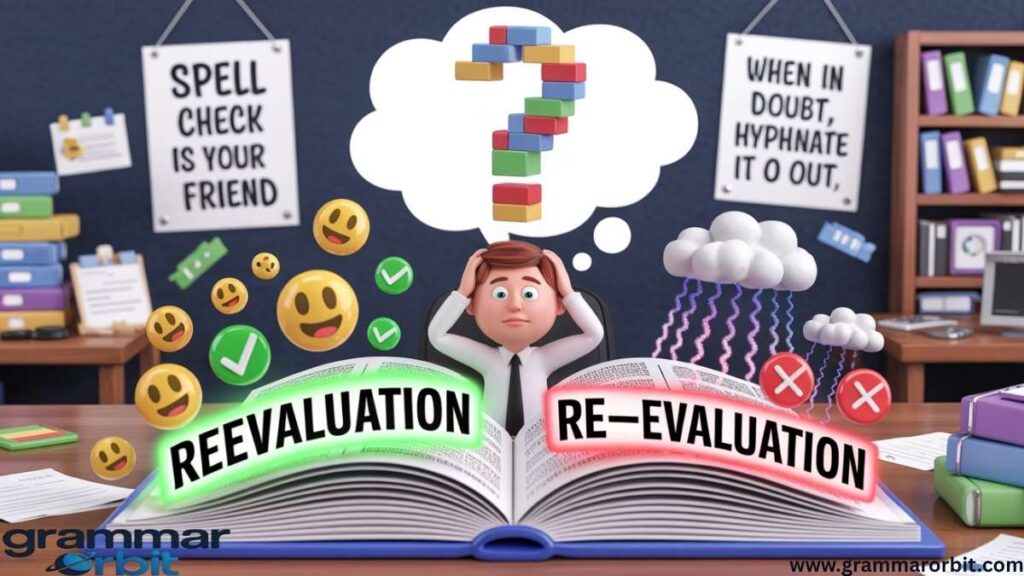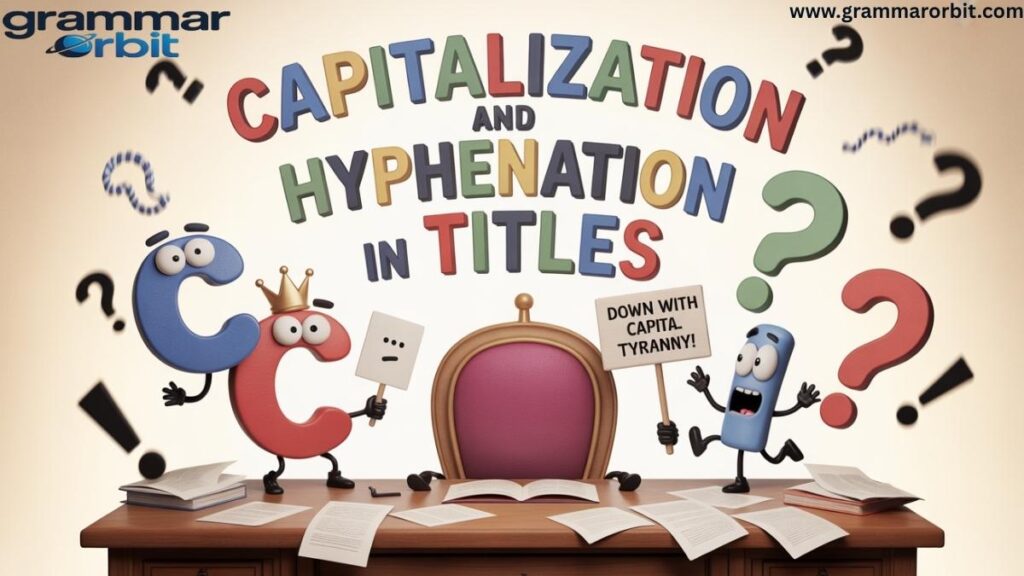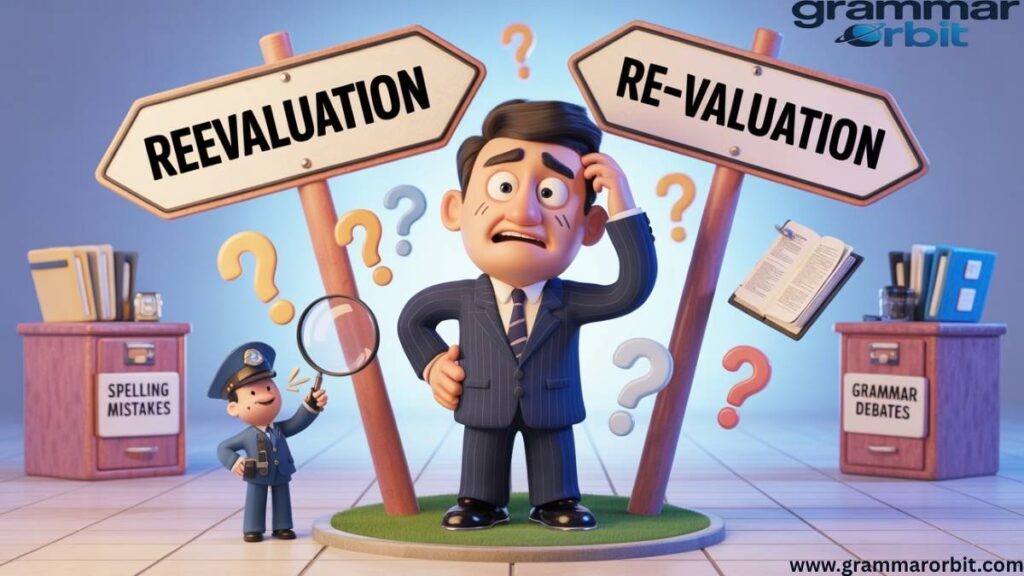Let’s be honest English grammar has more drama than a reality TV show. Just when you think you’ve got it figured out, along comes a sneaky little punctuation mark ready to ruin your confidence. Enter the hyphen, that tiny troublemaker responsible for endless debates like reevaluation or re evaluation. Do we keep it? Drop it? Hug it? Ghost it? American writers can’t seem to agree! One minute, your spellchecker cheers you on; the next, it red lines your masterpiece like a strict English teacher. But fear not this guide will finally settle the score, once and for all, with clarity, wit, and zero grammatical chaos.
What Is Hyphenation and Why It’s Confusing
Hyphenation connects words or word parts with a hyphen. Simple in theory, tricky in practice. Hyphens are used to:
- Form compound words (e.g., mother-in-law, part-time)
- Avoid confusion in meaning (e.g., re-cover vs. recover)
- Improve readability when similar vowels meet (e.g., re-enter)
But language evolves. Words that once needed a hyphen have fused into single forms. Email, online, and database all lost their hyphens over time. The pattern is obvious: modern American English favors simplicity.
The Prefix “Re-”: What It Means and Why It Matters
The prefix “re-” means again or back. It changes the base word’s meaning to show repetition or return. For example:
| Word | Meaning |
|---|---|
| Rebuild | Build again |
| Rewrite | Write again |
| Reopen | Open again |
The trouble starts when “re-” changes how the word looks or sounds, or when it risks confusion:
- Resign (to quit) vs. Re-sign (to sign again)
- Recover (to get better) vs. Re-cover (to cover again)
- Recreation (fun) vs. Re-creation (creating again)
- Meaning: “Re-” means again or back, showing repetition or reversal of an action.
- Common Usage: It appears in words like redo, rewrite, rebuild, and reconsider.
- Hyphen Rule: Use a hyphen only when the base word starts with a vowel (re-enter, re-educate) or to avoid confusion (re-sign vs. resign).
- Style Difference: American English often drops the hyphen, while British English tends to keep it.
- Purpose: It helps form new verbs or nouns that express a repeated or renewed action.
That tiny line can flip the meaning entirely.
When to Use a Hyphen with “Re-”
American English follows a few clear rules for “re-” hyphenation.
Use a hyphen when:
- The root word begins with “e.”
Examples: re-enter, re-educate, re-elect it keeps the word from looking awkward. - The word could be misread without it.
Examples: re-sign vs. resign, re-cover vs. recover.
Skip the hyphen when:
- The meaning stays clear without confusion.
Examples: reevaluate, rebuild, rewrite, redo. - The closed form is accepted in modern dictionaries.
Quick Tip: If you’re uncertain, check a reputable dictionary it reflects the most current American English standards.
Ong Meaning in Text: A Complete Guide for Online Users
Reevaluation vs. Re-evaluation: What Authorities Say

Here’s how major grammar and style authorities treat reevaluation vs. re-evaluation:
| Source | Preferred Form | Notes |
| Merriam-Webster | Reevaluation | American standard |
| Chicago Manual of Style | Reevaluation | Closed form preferred |
| APA Style | Reevaluation | Avoids unnecessary hyphens |
| MLA Handbook | Reevaluation | Modernized spelling |
| Oxford Dictionary | Re-evaluation | British usage |
Summary: In American English, reevaluation without a hyphen is the standard. The hyphenated version appears mainly in British English or older documents.
Reevaluation vs. Re-evaluation in American English
So, which one’s correct? Reevaluation wins in the U.S. The unhyphenated version matches current American grammar rules and modern dictionaries.
| Region | Preferred Form | Example |
| United States | Reevaluation | The company began a reevaluation of its goals. |
| United Kingdom | Re-evaluation | The policy is under re-evaluation by the committee. |
American English keeps it sleek and simple. British English leans more traditional.
Propose vs Purpose Meaning, Usage, and Examples
Why Some Writers Still Use the Hyphen

Despite updates in modern spelling, some writers still stick with re-evaluation. Reasons include:
- Habit from older grammar education.
- Belief that the hyphen improves clarity.
- Writing for an international or British audience.
- Institutional preference or editorial policy.
- The hyphen helps avoid the awkward double “ee,” making the word easier to read at a glance.
- Older style guides and British publications still favor the hyphen for consistency.
- Some academic or formal writers feel the hyphen gives the word a more polished, structured look.
- Writers may keep the hyphen to match other re words in the same document (like re-entry, re-examine).
- It prevents readers from momentarily stumbling over long or compound “re” words.
“Language is alive. The rules shift not by decree, but by use.” Deborah Tannen
If you’re writing for an American audience, drop the hyphen reevaluation looks cleaner and more professional.
Common Errors and Corrections
Writers often make avoidable mistakes with re- words. Here’s a quick guide:
| Incorrect | Correct | Why |
| Re-open | Reopen | Hyphen unnecessary |
| Re-consider | Reconsider | Closed form preferred |
| Re-enter | ✅ Correct | Prevents awkward double vowels |
| Re-cover | ✅ Correct | Different meaning from recover |
| Reevaluation | ✅ Correct | Modern American form |
Clarity Always Comes First
Great writing puts clarity before tradition. The goal isn’t to sound formal it’s to be understood. When deciding between reevaluation or re-evaluation, remember:
- Modern dictionaries favor reevaluation.
- Consistency matters more than nostalgia.
- Simple forms look better and read faster.
CYC Meaning in Text: Definition Usage and Contexts
Capitalization and Hyphenation in Titles

Even titles follow hyphenation rules. Here’s how to handle them:
Rules for Hyphenated Titles:
- Capitalize both parts of a hyphenated compound if both words carry weight.
Example: Re-Evaluation Process in Education - Don’t capitalize the second part if it’s a prefix or short connector.
Example: Reevaluation Policy Review
Examples:
- ✅ Reevaluation of Student Performance
- ✅ Re-Evaluation of Training Methods
- ❌ Re-Evaluation vs Reevaluation (inconsistent)
The Future of the Hyphen
Is the hyphen slowly disappearing? It seems so. As digital communication grows, shorter words read faster and look cleaner on screens.
| Old Form | Modern Form |
| on-line | online |
| data-base | database |
| co-operate | cooperate |
| re-evaluate | reevaluate |
English is simplifying. Hyphens are becoming rare survivors of an older era.
Quick Reference Chart: “Re-” Hyphen Rules
| Case | Hyphen? | Example | Reason |
| To prevent confusion | ✅ Yes | re-sign vs resign | Different meanings |
| Root word starts with “e” | ✅ Yes | re-enter | Avoids double vowels |
| Common closed form | ❌ No | reevaluate | Standard American form |
| Follows dictionary form | ❌ No | reopen | Accepted spelling |
Best Practices for Using “Re-” Words

To master hyphen rules in American English, follow these guidelines:
- Always verify with a dictionary.
- Use your style guide consistently (APA, Chicago, MLA, etc.).
- Be consistent within one document.
- Keep it simple only use hyphens when clarity demands it.
Example:
A university report once used both re-evaluation and reevaluation. The inconsistency stood out and reduced its credibility. After standardizing everything to reevaluation, the final draft looked cleaner and more professional.
Reference: Cambridge Dictionary Definitions
Here’s a trusted source for clear word meanings:
FAQs
Does “reevaluate” need a hyphen?
No. Reevaluate does not need a hyphen in American English. The correct and modern spelling is reevaluate written as one word. The form re-evaluate is more common in British English or in older texts. Most American dictionaries, such as Merriam Webster, list reevaluate as the preferred spelling.
What is the meaning of “re-evaluation”?
Re-evaluation (or reevaluation) means looking at something again to judge, measure, or assess it differently. The prefix “re-” means “again,” and “evaluation” means assessing something. Together, it means to review or reassess something that was already evaluated.
Example:
The company began a reevaluation of its yearly goals.
What does “reevaluate” or “re evaluate” mean?
Both refer to examining something again, but reevaluate is the only correct spelling in American English. Writing it as re evaluate (two separate words) is incorrect because “re” is a prefix, not a standalone word.
Example:
You should reevaluate your options before making a decision.
How to write “re-evaluate”?
In British English, it’s acceptable to write re-evaluate with a hyphen. In American English, the correct spelling is reevaluate one word, no hyphen.
Summary:
- American English → reevaluate
- British English → re-evaluate
When to add a hyphen after “re”?
Use a hyphen after “re” only when it avoids confusion or prevents awkward double vowels.
Use a hyphen when:
- The root word begins with “e.”
Examples: re-enter, re-educate, re-elect - The meaning changes without the hyphen.
Examples: re-sign (sign again) vs resign (quit), re-cover (cover again) vs recover (get better)
In all other cases, write the word without a hyphen.
How to use “reevaluate” in a sentence?
Here are some simple examples showing correct usage:
- “The teacher will reevaluate the test results next week.”
- “We need to reevaluate our marketing plan before launching.”
- “It’s smart to reevaluate your priorities once in a while.”
- “After feedback, the designer decided to reevaluate the layout.”
Conclusion
So, here’s the final word in this epic battle of punctuation pride: in the clash of reevaluation or re-evaluation, the hyphen loses its crown. American English has politely shown it the door no hard feelings, just cleaner spelling and happier readers.
The truth is, grammar isn’t about impressing anyone; it’s about making sense without giving readers a headache. So unless that little line saves you from confusion, let it rest. Keep your writing crisp, confident, and modern. And remember if grammar had a sense of humor, it would say: “It’s time for a reevaluation minus the hyphen!”
JHON AJS is an experienced blogger and the creative voice behind the website grammarorbit.com, namely Grammar Orbit. With a keen eye for language and a passion for wordplay, he creates engaging grammar insights, word meanings, and clever content that make learning English enjoyable and interesting for readers.






